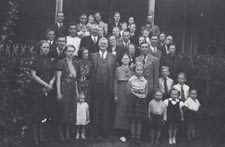Introduction
Taking a look at his childhood, it was not evident that Morris Dees
Jr. would become a civil rights lawyer leading a revolution against
hate groups in the United States. In fact, looking at his childhood
and academic career until high school, it seemed that Morris Dees Jr.
would become a preacher at the Pike Road Baptist Church. However, in
the latter years of his high school career, he leaned towards the occupation
of an entrepreneur, already earning himself nearly $5000 a year.
In his childhood, Morris Dees's future looked toward
the agricultural path. Both his father and his grandfather were a tenant
farmers. The life of a tenant farmer in the early part of the 20th century
wasn't easy. Morris Dees Sr. did not want his son to follow in his footsteps.
He wanted his son to become a lawyer.
Morris Dees Jr. was known as "Bubba" to his friends and family. He
grew up in the South in a place called Mount Meigs, Alabama. Because
he came from a line of tenant farmers, he worked on the farm from the
time he could lift a hoe. Cotton was the king crop of the south. Being
such, his family farmed cotton.
Family History : His family came from a line of Scots. They sailed to
America in the early 18th century. From Coastal North Carolina, the
Dees family migrated across the south and eventually into central Alabama.
: His family came from a line of Scots. They sailed to
America in the early 18th century. From Coastal North Carolina, the
Dees family migrated across the south and eventually into central Alabama.
The Dees family never owned a single piece of land while they were
in America. Because they were tenant farmers, their lives were always
changing. The possibility of their leases being terminated caused them
to constantly move from one home to another. It was a life of packing
and moving. However, the Dees family finally owned some land when Morris
Seligman Sr. purchased 110 acres of the Wigglesworth Estate in Mount
Meigs.
Grandfather
Morris Seligman Dees Sr. was born in 1909 to Arthur Lee Dees. Morris
Dees Sr. was named after a Jewish Merchant in Montgomery, whom Grandpa
Dees admired. Morris Seligman Dees Sr. was the oldest of eight children.
When Arthur Lee Dees died, Morris Sr. dropped out of high school and
worked on the farm to support his family. He did not have a chance to
get an education that would allow him to escape the life of a tenant
farmer. The dream of escaping such a life would have to be lived through
his son.
Morris Dees Jr.'s maternal great grandfather served in Joe Wheeler's
Confederate Cavalry during the Civil War. He fought for the superiority
of the whites in the South. His maternal grandfather was a member of
the Ku Klux Klan. His mother, Annie Ruth Dees, was a devout Christian.
As a child, she did not question her father and his secretive actions.
She did not know nor understand what he did. When she became an adult,
she learned that he was a member of the Ku
Klux Klan. However, when Annie Ruth Dees grew up, she interpreted
the Bible and its teachings more literally than her friends in the South.
She believed that to be true to the Christian faith, she had to be kind
to all of God's children, which (to her) including Blacks. Morris Jr.
recalled times when his mother sat at the kitchen table with some of
the Black hands that worked on the farms. She would help them fill out
forms to social services or help them apply for welfare. She even let
them sit on the table! Not only so, but she spoke to them. She spoke
to them in conversation and enjoyed it. Many of the blacks in the vicinity
knew to come to Annie Ruth Dees for help or just plain conversation.







